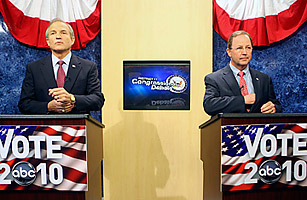
Texas Democratic Representative Chet Edwards, left, and his opponent, Republican Bill Flores, prepare for a debate Sunday, Oct. 24, 2010, in Waco
A star in the Texas Democratic firmament, Chet Edwards is often referred to as "George Bush's Congressman," since the former President's Crawford ranch lies in Texas' 17th District — a swath of conservative territory that stretches south from Fort Worth suburbs through Waco and the Baptist heartland, embracing Baylor University, and then southeast to Bryan–College Station, home to Texas A&M University. Edwards is the last Blue Dog Democrat in Congress from Texas; other fiscally conservative, socially moderate Texas Congressmen have either crossed the aisle, like Congressman Ralph Hall, or gone down to defeat, like former Congressman Charlie Stenholm. And this year, with the GOP riding a wave that could give it a historic takeover of the House, Edwards is trying his hardest to avoid the same fate as his old defeated colleagues.
Edwards won two years ago with 53% of the vote in a district John McCain carried with 67%. That sort of staying power has won Edwards a seat on the Appropriations Committee and chairmanship of its veterans-affairs subcommittee. It also prompted Speaker Nancy Pelosi to urge then candidate Barack Obama to consider Edwards for the vice-presidential slot. But that blessing and Edwards' enthusiastic endorsement of Obama in the crucial Texas primary have put the Congressman at risk.
One of the first moves by Republican challenger Bill Flores, a 56-year-old retired energy executive who lives in Bryan and, like Edwards, graduated from Texas A&M University, was to erect several billboards in the district showing Edwards shoulder to shoulder with President Obama on the campaign trail. Television ads followed, linking Edwards to Pelosi with the tagline: "Our Congressman has changed. It's time to change our Congressman." In mid-September, Flores released a poll claiming he held a 19-point lead over Edwards, On Oct. 7, the Edwards campaign released an internal poll, showing he was four points down, but spun the numbers as good news since an earlier, unreleased internal poll had shown him down 10 points. There were no independent polls in the race until late in the game — on Oct. 27, the Hill newspaper released polls of 42 competitive races done by the Democratic polling firm of Penn Schoen Berland, which found Edwards trailing by 12 points, 52-40.
Edwards is fighting on two fronts, battling Washington as well as Flores. He responded to Flores attack with his own ad distancing himself from Obama and Pelosi: "When President Obama and Nancy Pelosi pressured Chet Edwards, Chet stood up to them and voted no against their trillion-dollar health care bill, and no to cap and trade ... and when Washington liberals wanted to take away our guns, Chet said no." The ad touted Edwards' endorsement by the National Rifle Association. It also noted Edwards' support for "Chamber of Commerce issues" — a prescient touch, since the White House has since unleashed an attack on the U.S. Chamber of Commerce over foreign funds allegedly being used for campaign donations.
In early October, Edwards admitted to the editorial board of the Dallas Morning News that he was an underdog, a role he said he relished. "It's a tough environment out there. People are upset at Washington — I'm upset at Washington," Edwards told KWTX-TV in Waco. But while he points out his opposition the health care bill and cap and trade, he defends his support for the stimulus bill as "the right thing to do."
First as a state senator from 1983 to 1990, then for 20 years as a Congressman, Edwards has held a front-row seat to what has been a tectonic shift in Texas politics: the exodus of conservative Democrats to Republican ranks. Back in the 1960s, the old joke was that Texas Republicans held their meetings in a phone booth. Most election fights were springtime contests when conservative and liberal Democrats battled in the primary, but the Reagan Revolution was a game changer. Conservative Democrats began to cross the aisle — among them current governor Rick Perry — and in 1998 George W. Bush led the Texas GOP to a clean sweep of top statewide races. In 2002 Republicans took control of both chambers, prompting an unprecedented mid-decade redistricting battle, orchestrated by the then Republican majority leader, Texas Congressman Tom DeLay. Edwards was a prime target, and his district was redrawn — more Republicans from the western suburbs of Fort Worth were added, and Fort Hood, the massive Army base near Waco, was stripped away, denying the Congressman domain over a mother lode of influence. Six years later, Edwards is facing his fourth challenge in the newly drawn district.